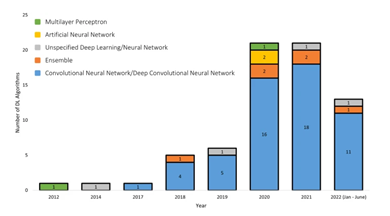18 December 2023
Artificial Intelligence (AI) in Dermatology - Diagnosing and Monitoring Skin Disease - New Lay Summary Available
An innovative study published in npj Digital Medicine exploring the role of Artificial Intelligence (AI) in diagnosing and monitoring skin disease, shows promising application in healthcare developments.
The systematic review was led by researchers at St John's Institute of Dermatology, Guy's & St Thomas' Hospital and King's College London. It was funded by the National Institute for Health and Care Research (NIHR) Guy’s and St Thomas’ Biomedical Research Centre and support for this work was also received from the Psoriasis Association.
The study looked at how deep learning, a type of AI, can be used to analyse skin photographs and help diagnose and monitor various skin diseases. The research team have summarised the main findings below.
AI-enabled analysis of skin photographs shows potential for the diagnosis and monitoring of inflammatory skin conditions including psoriasis and eczema
A new systematic review shows that Artificial Intelligence (AI) enabled analysis of skin photographs may be helpful in the diagnosis and monitoring of skin diseases, including chronic inflammatory skin conditions such as psoriasis and eczema.

Skin diseases affect one in three people worldwide, presenting a major challenge for our healthcare system. There are rising trends for skin healthcare to be delivered ‘virtually’. Patients can share their concerns with doctors online via messaging platforms, video calls, and sending photographs of their skin. These touchpoints of communication contribute towards a fast-growing resource of skin photographs, which, along with advances in computing capability, have opened opportunities for AI solutions in dermatology.
In a recent systematic review published by npj Digital Medicine, researchers screened thousands of published articles to comprehensively assess how accurate AI-enabled analysis of skin photographs was in diagnosing and evaluating the severity skin conditions, such as chronic inflammatory skin conditions including acne, psoriasis, eczema, rosacea, vitiligo, and urticaria.
The systematic review indicates that.
AI-enabled analysis of skin photographs could also accurately assess the severity of skin conditions such as psoriasis, eczema and acne.
However, while these findings are promising, 92% of studies had high risk of bias judgements and 97% had high-level applicability concerns. There are a number of limitations of current AI research to consider. There was inconsistent reporting of key details about the patients who provided the images; for example, ethnicity information was reported in less than 20% of studies. There is a need for more inclusive study recruitment so that skin photographs used for AI-enabled analysis are more representative of those individuals with skin conditions. Larger skin photograph datasets with detailed accompanying clinical information are required to develop reliable AI solutions.
These AI solutions need to be tested in large independent skin photography datasets in real-world clinical settings before researchers obtain the evidence for use in routine healthcare.
In January 2024, a podcast will be available where researchers Dr Alexandra Paolino and Dr Shern-Ping Choy discuss the findings of the systematic review. More details to follow.
The full paper is available to read online.